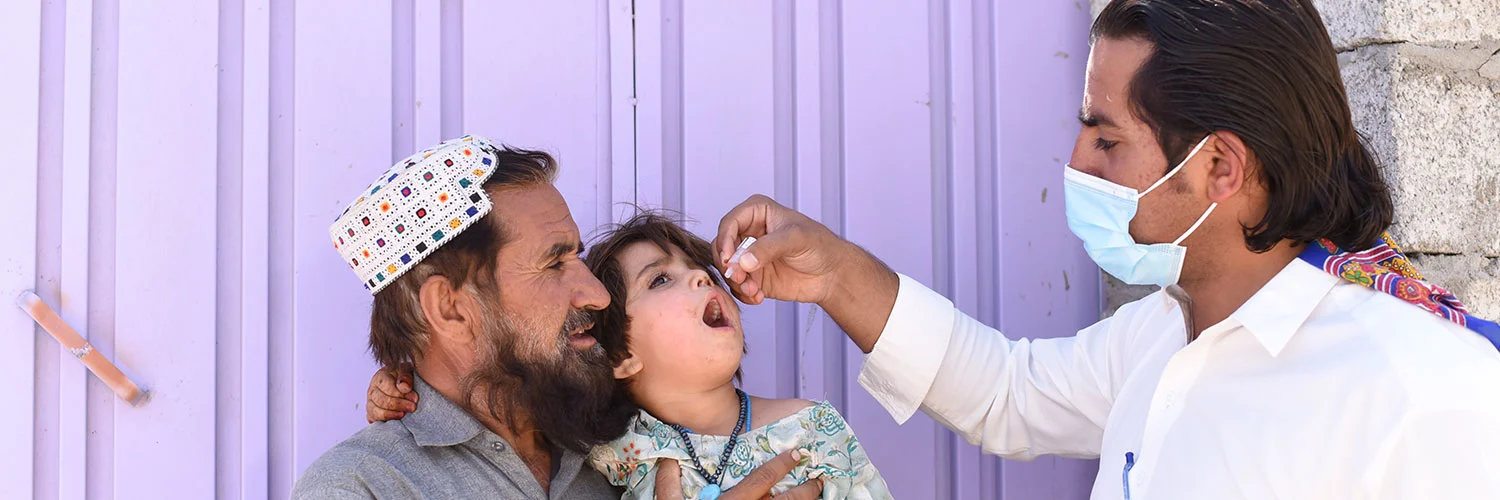Islamabad, 29 March 2017---The Technical Advisory Group (TAG) on polio eradication will meet in Islamabad on Thursday and Friday this week to assess the programme progress, opportunities, and the remaining challenges towards achieving the goal of stopping transmission of the poliovirus. The last TAG urged the Pakistan Polio Eradication Programme to maintain the high quality of campaigns being undertaken and to focus on improving overall performance and results in the polio core reservoir areas, to identify and address residual risks and to act swiftly in response to any risks.
The Government of Pakistan including Minister of National Health Services, Regulations and Coordination and Prime Minister’s Focal Person for Polio Eradication will be joined by Federal and Provincial Health Secretaries at the TAG. Senior Global Polio Eradication Initiative representatives including the Regional Director for the WHO Eastern Mediterranean Region and UNICEF Regional Director for East Asia and the Pacific will also join. Together they will deliberate with TAG members on the progress made since the last meeting in June 2016 and will assess plans for the upcoming months with the goal of defeating the virus.
Since the last TAG, the Pakistan Polio Eradication Initiative (PEI) has made tremendous progress towards polio eradication. Progress has been built on a very solid foundation of government commitment and support, strengthened programme performance and broad community acceptance as a result the number of children paralysed by the wild poliovirus has dropped from 54 Wild Polio Cases in 2015 to 20 in 2016 and 2 cases in 2017 so far. The current polio epidemiology and the programme momentum remains the best we have ever seen in Pakistan - the goal however remains zero cases.
The operational bedrock of PEI has been the Emergency Operation Centres (EOCs), working as ‘one team under one roof’. The EOC has been an essential platform for Government staff and GPEI partners to come together and has played an instrumental role in the progress made over the past two years. Thanks to the EOCs, the programme is now driven by high-quality data and comprehensive, real-time risk assessment and monitoring, resulting in better campaign quality.
In order to efficiently detect virus wherever it may exist, the number of sites for environmental surveillance has been increased since the last TAG to a total of 53 sampling sites across the country, making it the largest polio environmental surveillance network in the world. This is a critical step as the country edges closer to stopping transmission as it enables us to detect the virus and respond quickly.
Tackling the virus in the Pakistan-Afghanistan single epidemiological block and for both countries to closely collaborate with one another will be a driving factor for the world to be polio free. Representatives of the Polio Eradication Programme in Afghanistan will therefore also be present at the meeting to strengthen coordination. The two National Emergency Operation Centres of Pakistan and Afghanistan will attend each other’s TAG as a step further to address common challenges more effectively.
At this juncture, the virus is under immense pressure – the goal remains to interrupt polio transmission and sustain gains until eradication. Pakistan as a nation will need to stay focused and united in order to achieve this landmark not only for our children but also for the world’s children.
Note for the editor:
The Technical Advisory Group (TAG) was established to review progress towards polio eradication in specific countries, assess implementation of previous TAG recommendations, discuss planned activities and issue recommendations to address constraints facing national programmes in achieving their targets. TAG meetings are attended by country-specific TAG members, national representatives and partner organizations, both international and regional.
The TAG meets twice a year to review progress and provide expert advice on the final road to reaching zero. The meeting brought together polio eradication experts from the government of Pakistan, lead implementing partners including, the World Health Organization (WHO), the United Nations Children’s Fund (UNICEF), senior representatives from across the Global Polio Eradication Initiative (GPEI): Rotary International, Bill and Melinda Gates Foundation and the US Centres for Disease Control and representatives of key donors and donor countries.
For further information, please contact:
Sajid Hussain Shah, Public Relation Officer, MoNHRS&C, 03006305306, This email address is being protected from spambots. You need JavaScript enabled to view it.

